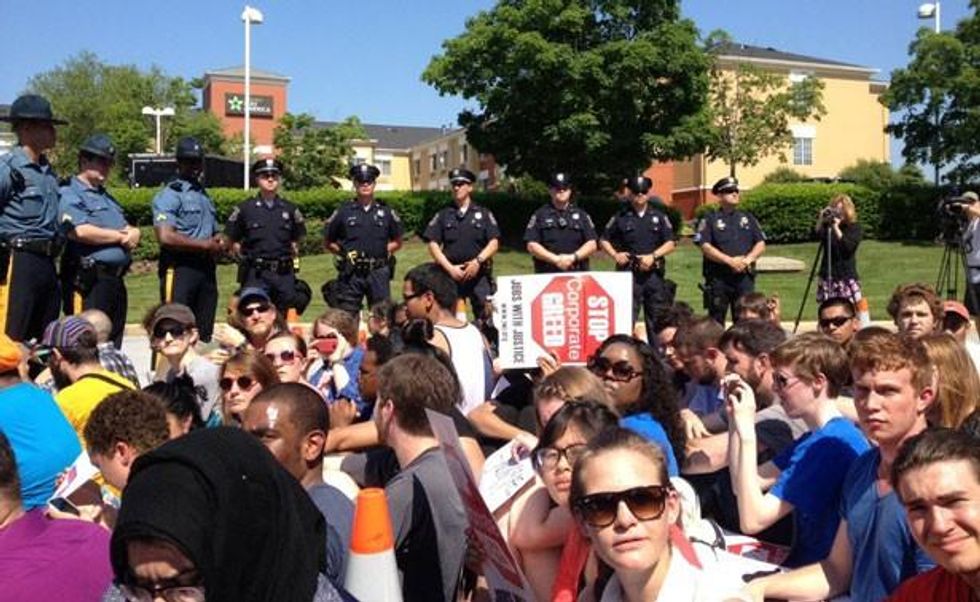Nearly two hundred students, parents, community members and union leaders rallied at Sallie Mae's annual shareholders meeting in Newark, Delaware yesterday. On the agenda: first, demand that the nation's largest private student loan lender meet directly with students to discuss their crushing debt burden; and second, introduce a shareholder resolution calling for disclosure of the corporation's lobbying practices and membership in groups such as the
American Legislative Exchange Council (
ALEC).
Outside of Sallie Mae's corporate headquarters, the activists were met by "dozens of police, blockades and K-9 units," according to participants. Sarita Gupta, executive director of Jobs with Justice & American Rights at Work, urged the crowd to confront Sallie Mae executives and board members "about their role in America's student debt crisis."
More than 38 million people now owe over $1.1 trillion in student debt; Sallie Mae owns approximately 15 percent of that debt, or $162.5 billion. Students owe an average of $27,000 when they graduate from college and many have a debt load several times greater than that amount. Nearly one in ten will default on their loans within two years.
Gupta noted that Sallie Mae "spent $16 million on federal lobbying from 2008 to 2012 and has more than 60 state lobbyists." The corporation has lobbied at the federal level "to block student loan reform," and at the state level "for reduced public investment in higher education, forcing more students to rely on private student loans."
"They're in the business of condemning students to a lifetime of debt, not making education a reality," said Sara Fitouri, a law student at the University of Denver, who owes $145,000 in student debt.
"They show that when we privatize something that used to be in the public realm it can lead to horrible results," said Sam Nelson, a junior at George Washington University who expects to graduate with approximately $50,000 in student loan debt.
Sallie Mae was indeed created as a government-sponsored enterprise in 1972, and transitioned to a fully privatized bank lender between 1997 and 2004. Organizers say that as the largest lender it now sets the trends and standards for the industry.
Gupta spoke out against profit margins that continue to increase for Sallie Mae as "student debt and student loan defaults escalate at an unsustainable pace." She noted that the senior management team of five executives made more than $20 million combined in 2011; the former CEO--who just announced his retirement--was paid $35 million from 2007 to 2011.
Twenty of the activists entered Sallie Mae headquarters as legal proxies for shareholders with a right to vote. The groups they represented included: the United States Student Association, the Student Labor Action Project, Common Cause, the Responsible Endowment Coalition, the American Federation of Teachers (AFT) and Jobs with Justice & American Rights at Work. Sallie Mae personnel attempted to restrict these individuals to a holding area but the activists successfully negotiated their way into the meeting.
Prior to introducing the shareholders resolution, Randi Weingarten, president of the AFT whose members' pension plans have more than $1 trillion in assets and are long-term shareholders of Sallie Mae, said: "As Sallie Mae profits from billions of dollars of student loans, it has an obligation to students, educators and shareholders to be transparent about its lobbying efforts, including on student loan reform."
The resolution asked that the board disclose in an annual report the corporation's policies, procedures, and payments for direct and indirect lobbying; as well as its membership and payments to any tax-exempt organization "that writes and endorses model legislation." (See ALEC.) Although there has yet to be a tally of the vote, organizers hope that they received the support of approximately 30 percent of the shareholders.
Following the vote, the students won a long-fought victory: newly named Sallie Mae CEO Jack Remondi agreed to their demand to meet next month. His predecessor had been steadfast in his refusal to allow the students a seat at the table.
"We are going to work hard and be ready to give him a run for his money," said Nelson. "We'll get a lot of no's, but if we organize enough we might get a few yes's. Ultimately though, what's going to bring the pressure to [get] the change we need is what's worked in the past for other issues--organizing, direct action, and taking the fight to them in their own backyard."
The promise of privatization of the student loan industry was that there would be greater efficiency and therefore more opportunities for students to pay for college and thrive. That is clearly not what Sallie Mae and the big banks have delivered to students like Sam, Sara, and their families--not to mention the millions of young people who are priced out of college.
"After we win this campaign against Sallie Mae, we are not going to stop until student debt is a thing of the past," said Nelson. "We fundamentally believe that education is a right and it should be free and accessible to all people who wish to pursue it. We know that free education has worked in the past, and that the government and companies are choosing not to do it--and to fight against it--for their own political or profit-motivated reasons."




